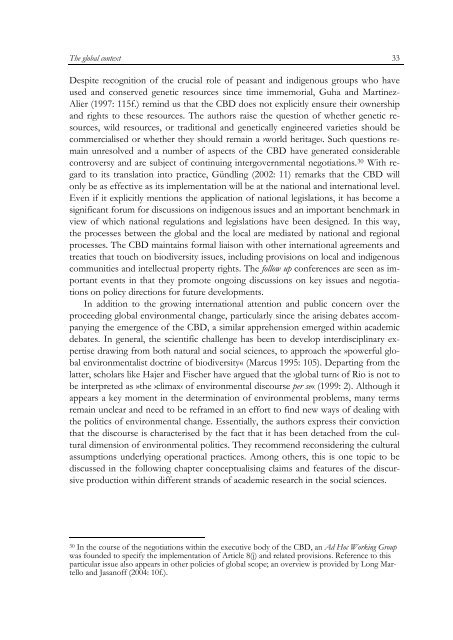The cultural context of biodiversity conservation - Oapen
The cultural context of biodiversity conservation - Oapen
The cultural context of biodiversity conservation - Oapen
You also want an ePaper? Increase the reach of your titles
YUMPU automatically turns print PDFs into web optimized ePapers that Google loves.
<strong>The</strong> global <strong>context</strong><br />
Despite recognition <strong>of</strong> the crucial role <strong>of</strong> peasant and indigenous groups who have<br />
used and conserved genetic resources since time immemorial, Guha and Martinez-<br />
Alier (1997: 115f.) remind us that the CBD does not explicitly ensure their ownership<br />
and rights to these resources. <strong>The</strong> authors raise the question <strong>of</strong> whether genetic resources,<br />
wild resources, or traditional and genetically engineered varieties should be<br />
commercialised or whether they should remain a ›world heritage‹. Such questions remain<br />
unresolved and a number <strong>of</strong> aspects <strong>of</strong> the CBD have generated considerable<br />
controversy and are subject <strong>of</strong> continuing intergovernmental negotiations. 30 With regard<br />
to its translation into practice, Gündling (2002: 11) remarks that the CBD will<br />
only be as effective as its implementation will be at the national and international level.<br />
Even if it explicitly mentions the application <strong>of</strong> national legislations, it has become a<br />
significant forum for discussions on indigenous issues and an important benchmark in<br />
view <strong>of</strong> which national regulations and legislations have been designed. In this way,<br />
the processes between the global and the local are mediated by national and regional<br />
processes. <strong>The</strong> CBD maintains formal liaison with other international agreements and<br />
treaties that touch on <strong>biodiversity</strong> issues, including provisions on local and indigenous<br />
communities and intellectual property rights. <strong>The</strong> follow up conferences are seen as important<br />
events in that they promote ongoing discussions on key issues and negotiations<br />
on policy directions for future developments.<br />
In addition to the growing international attention and public concern over the<br />
proceeding global environmental change, particularly since the arising debates accompanying<br />
the emergence <strong>of</strong> the CBD, a similar apprehension emerged within academic<br />
debates. In general, the scientific challenge has been to develop interdisciplinary expertise<br />
drawing from both natural and social sciences, to approach the »powerful global<br />
environmentalist doctrine <strong>of</strong> <strong>biodiversity</strong>« (Marcus 1995: 105). Departing from the<br />
latter, scholars like Hajer and Fischer have argued that the ›global turn‹ <strong>of</strong> Rio is not to<br />
be interpreted as »the ›climax‹ <strong>of</strong> environmental discourse per se« (1999: 2). Although it<br />
appears a key moment in the determination <strong>of</strong> environmental problems, many terms<br />
remain unclear and need to be reframed in an effort to find new ways <strong>of</strong> dealing with<br />
the politics <strong>of</strong> environmental change. Essentially, the authors express their conviction<br />
that the discourse is characterised by the fact that it has been detached from the <strong>cultural</strong><br />
dimension <strong>of</strong> environmental politics. <strong>The</strong>y recommend reconsidering the <strong>cultural</strong><br />
assumptions underlying operational practices. Among others, this is one topic to be<br />
discussed in the following chapter conceptualising claims and features <strong>of</strong> the discursive<br />
production within different strands <strong>of</strong> academic research in the social sciences.<br />
30 In the course <strong>of</strong> the negotiations within the executive body <strong>of</strong> the CBD, an Ad Hoc Working Group<br />
was founded to specify the implementation <strong>of</strong> Article 8(j) and related provisions. Reference to this<br />
particular issue also appears in other policies <strong>of</strong> global scope; an overview is provided by Long Martello<br />
and Jasan<strong>of</strong>f (2004: 10f.).<br />
33

















